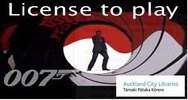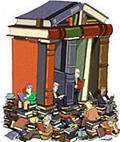Blogging & Musing...
 Ever get that “ah-ha!” feeling when reading? You come across a passage that practically shouts, “Hey, pal. Pay attention—this is YOU we're talkin' about.” It’s eerie, sometimes unnerving.
Ever get that “ah-ha!” feeling when reading? You come across a passage that practically shouts, “Hey, pal. Pay attention—this is YOU we're talkin' about.” It’s eerie, sometimes unnerving.
One of the narrators of Nicole Krauss’s Great House describes herself in a lengthy passage…and I felt an itch of recognition, a not very pleasant itch either…so I won’t quote it here.
But I love that books can do that…make us see ourselves…recall feelings and experiences…and put them into words! It’s uncanny.
Question for Book Clubs
Was there a particular character—or moment—in the book you’re reading now that gave you a sense of self-recognition? What about in other books? If you’ve come across those passages, can you recall how they made you feel?
 Gotta toot my own horn. When I started my LitLovers website, I’d no idea how it might be used . . . or that readers around the globe would tune in.
Gotta toot my own horn. When I started my LitLovers website, I’d no idea how it might be used . . . or that readers around the globe would tune in.
A library site in Auckland, New Zealand, uses LitLovers as part of their web 2.0 training exercise—and what a cool site to be listed on. Take a look.
Lots of libraries have training blogs to teach staff how to maneuvre the new world wide web (web 2.0)—which refers to the new level of interactivity on the Net—sites like Del.ic.ious, StumbleUpon, GoodReads, FaceBook, Wikipedia, LibraryThing, and personal blogs.
LitLovers has been used on a number of library training sites in the US, but the New Zealand one is a particularly gratifying! Spend some time on it yourself—we can all learn more about this new web environment.
 Books on the Brain.com Check out my guest column on one of the best book blogs on the Net. I talk about the fact that book clubs are saving the world for democracy!
Books on the Brain.com Check out my guest column on one of the best book blogs on the Net. I talk about the fact that book clubs are saving the world for democracy!
Had you any idea how important you were?
 A NY Times article (2/25/09) pondered whether a Liberal Arts education will be around much longer. Recent trends suggest maybe not.
A NY Times article (2/25/09) pondered whether a Liberal Arts education will be around much longer. Recent trends suggest maybe not.
When I taught English, a number of students resented the time my class took from their studies in science & technology or business & finance. Those are the disciplines that would pay them good money . . . and pay off their tuition loans. But English? What good is it?
You can talk till you’re blue in the face—and I did—about the power of language, about the importance of clear thinking and coherent, persuasive writing—the things liberal arts teach us.
After all, it was Bethany McClean, a former English major who first cracked the Enron scandal—because, as she said, she knew the right questions to ask. There are lots of stories like that.
And I talked about how the humanities explore the important questions of life—
How does one lead a good life in a not-so-good world?
What does it mean to be human?
But, honestly? $20,000 a year is a lot money to spend on trying to figure out what your humanity’s about.
So maybe the pursuit of liberal arts is a luxury we can no longer afford. That’s what more than a few in the ivory towers are suggesting.
Questions for Book Clubs
- If college humanities courses fall off a cliff . . . will book clubs pick up the slack? After all, to read and discuss books is to engage the very questions posed by humanities.
- But then who said book clubs are supposed to solve society’s problems? Isn’t our roll simply to enjoy reading and sharing ideas, large or small?
 Do we have to love a book's main character? What happens if we despise the hero/heroine?
Do we have to love a book's main character? What happens if we despise the hero/heroine?
I just read a blurb for Zoe Heller's new book, Believers. Critics are praising it up and down, though some find the characters unlikable ... can’t relate to them ... even find them NASTY!
So, back to my question. Can we enjoy a book without liking its characters? Love the book, hate her—as in Serena, another recent book with a heroine no one can stand.
How about Emma—Jane Austen’s masterpiece? Even Austen knew her dear readers would have trouble liking her control-freak-of-a-heroine. Then there's Lolita, featuring one of the most dastardly heroes in all of literature? Humbert Humbert is surely enduring if not endearing—and the book is considered one of the great works of the 20th century.
Still ... it’s hard to get into a book when characters are unlikable. Am I alone? Probably not.
Questions for Book Clubs
- Can a bad character ruin a good book?
- How do you begin most of your book discussions—by talking about the characters? And if you don’t like the main character...where does the discussion go? Does it peter out?
- If a character is unlikable, is it intentional on the part of the author? To what end?
 So pretty. So Blonde. So articulate. Did I mention thin? On top of that, she writes Eat, Pray, Love, a terrific besteller. (Me? I’d have called it Eat, Eat, Eat…but then it’s her book, and as I said, she’s thin.)
So pretty. So Blonde. So articulate. Did I mention thin? On top of that, she writes Eat, Pray, Love, a terrific besteller. (Me? I’d have called it Eat, Eat, Eat…but then it’s her book, and as I said, she’s thin.)
I ran across her on a video interview on the "Barnes & Noble Studio" page, Meet the Authors. It’s fun place to visit—good interviews with interesting authors.
Also check out Borders Book Club, another set of videos featuring an Ann Arbor, Michigan, book club that invites top authors in to speak.
Book Clubs can get some good ideas of books to read, authors to check out, discussion questions to ask. The videos are interesting enough to play in your meetings.
 Two good articles appeared recently about re-reading. Roger Angell of The New Yorker and Verlyn Klinkenborg of The New York Times both talk about the joys of returning to favorite books.
Two good articles appeared recently about re-reading. Roger Angell of The New Yorker and Verlyn Klinkenborg of The New York Times both talk about the joys of returning to favorite books.
Here’s Verlyn (we’re on a first-name basis, at least I am):
Part of the fun of re-reading is that you are no longer bothered by the business of finding out what happens.... I’m able to pay attention to what’s really happening in the language itself—a pleasure surely as great as discovering who marries whom, and who dies, and who does not. (The New York Times 5/29/09)
For Book Clubs
Use part of a meeting to talk about books any of you have re-read—and why (why re-read and why that book?). Was re-reading a different experience—more interesting, or less? Have you read any book more than twice, thrice...?
Site by BOOM
![]()
LitLovers © 2024
